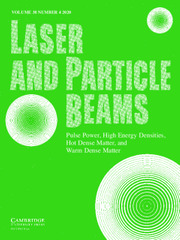Crossref Citations
This article has been cited by the following publications. This list is generated based on data provided by Crossref.
FINCKE, J.R.
LANIER, N.E.
BATHA, S.H.
HUECKSTAEDT, R.M.
MAGELSSEN, G.R.
ROTHMAN, S.D.
PARKER, K.W.
and
HORSFIELD, C.J.
2005.
Effect of convergence on growth of the Richtmyer-Meshkov
instability.
Laser and Particle Beams,
Vol. 23,
Issue. 1,
p.
21.
Long, C. C.
Krivets, V. V.
Greenough, J. A.
and
Jacobs, J. W.
2009.
Shock tube experiments and numerical simulation of the single-mode, three-dimensional Richtmyer–Meshkov instability.
Physics of Fluids,
Vol. 21,
Issue. 11,
Mariani, C.
Biamino, L.
Jourdan, G.
Houas, L.
Vandenboomgaerde, M.
and
Souffland, D.
2012.
28th International Symposium on Shock Waves.
p.
371.
Prestridge, Katherine
Orlicz, Gregory
Balasubramanian, Sridhar
and
Balakumar, B. J.
2013.
Experiments of the Richtmyer–Meshkov instability.
Philosophical Transactions of the Royal Society A: Mathematical, Physical and Engineering Sciences,
Vol. 371,
Issue. 2003,
p.
20120165.
Luo, Xisheng
Wang, Xiansheng
and
Si, Ting
2013.
The Richtmyer–Meshkov instability of a three-dimensional interface with a minimum-surface feature.
Journal of Fluid Mechanics,
Vol. 722,
Issue. ,
Luo, Xisheng
Guan, Ben
Si, Ting
Zhai, Zhigang
and
Wang, Xiansheng
2016.
Richtmyer-Meshkov instability of a three-dimensionalSF6-air interface with a minimum-surface feature.
Physical Review E,
Vol. 93,
Issue. 1,
Zhou, Ye
2017.
Rayleigh–Taylor and Richtmyer–Meshkov instability induced flow, turbulence, and mixing. I.
Physics Reports,
Vol. 720-722,
Issue. ,
p.
1.
Wang, Tao
Tao, Gang
Bai, Jingsong
Li, Ping
Wang, Bing
Du, Lei
and
Xiao, Jiaxin
2017.
Dynamical behavior of the Richtmyer–Meshkov instability-induced turbulent mixing under multiple shock interactions.
Canadian Journal of Physics,
Vol. 95,
Issue. 8,
p.
671.
Guan, B.
and
Luo, Xisheng
2017.
30th International Symposium on Shock Waves 2.
p.
1103.
Guan, Ben
Zhai, Zhigang
Si, Ting
Lu, Xiyun
and
Luo, Xisheng
2017.
Manipulation of three-dimensional Richtmyer-Meshkov instability by initial interfacial principal curvatures.
Physics of Fluids,
Vol. 29,
Issue. 3,
Zhai, Zhigang
Zou, Liyong
Wu, Qiang
and
Luo, Xisheng
2018.
Review of experimental Richtmyer–Meshkov instability in shock tube: From simple to complex.
Proceedings of the Institution of Mechanical Engineers, Part C: Journal of Mechanical Engineering Science,
Vol. 232,
Issue. 16,
p.
2830.
Danilin, A. V.
and
Solovjev, A. V.
2019.
Simulation of Turbulent Mixing by the CABARET Algorithm for the Case of a Richtmyer–Meshkov Instability.
Mathematical Models and Computer Simulations,
Vol. 11,
Issue. 2,
p.
247.
Guan, Ben
Wang, Dayi
Wang, Ge
Fan, E.
and
Wen, Chih-Yung
2020.
Numerical study of the Richtmyer–Meshkov instability of a three-dimensional minimum-surface featured SF6/air interface.
Physics of Fluids,
Vol. 32,
Issue. 2,
Liang, Yu
Liu, Lili
Zhai, Zhigang
Si, Ting
and
Luo, Xisheng
2021.
Universal perturbation growth of Richtmyer–Meshkov instability for minimum-surface featured interface induced by weak shock waves.
Physics of Fluids,
Vol. 33,
Issue. 3,
Liang, Yu
2022.
Fundamental Studies of Shock-Driven Hydrodynamic Instabilities.
p.
37.
Liang, Yu
2022.
Fundamental Studies of Shock-Driven Hydrodynamic Instabilities.
p.
1.

